At first glance, Tufts University Medford-Somerville looks like a typical liberal arts college. Big brick buildings are surrounded by long sidewalks, spacious mowed lawns, and mulched garden beds. Located five miles north of Boston, Massachusetts, in one of the most densely populated urban areas in the US, the campus doesn’t exactly conjure images of nature. And yet, it’s teeming with biodiversity: over 115 species of insect pollinators—bees, butterflies and moths, wasps, hover flies, and beetles—call campus home.
Cities around the world—New York, Toronto, Berlin, Boston—are pollinator hotspots. As habitat loss and pesticide use threaten pollinator populations in semi-natural areas, cities have emerged as a new frontier for conservation. Successful urban pollinator conservation hinges on creating enough flowering gardens to sustain populations of insect pollinators. So, in 2019, a group of five biology graduate students at Tufts joined in the movement by converting ornamental gardens to native pollinator habitat and developing a campus-wide plan to eliminate pesticide use. But the Tufts campus is small—just 150 acres—most of which is occupied by buildings, lawns, and parking lots. Enhancing habitat on campus was a good first step, but ultimately they would need buy-in from thousands of private landowners in the community to make a difference.
Tufts Pollinator Initiative (TPI) was born. Over the past three years, we—the TPI leadership team—have worked to conserve urban pollinators both by creating habitat and by engaging, educating, and empowering community members how to do so too. We are all passionate, enthusiastic students, and in the process, we have become experienced educators both in and out of the classroom. And we are just getting started: we have financial support from the university via Tufts Green Fund to keep our program running for years to come.
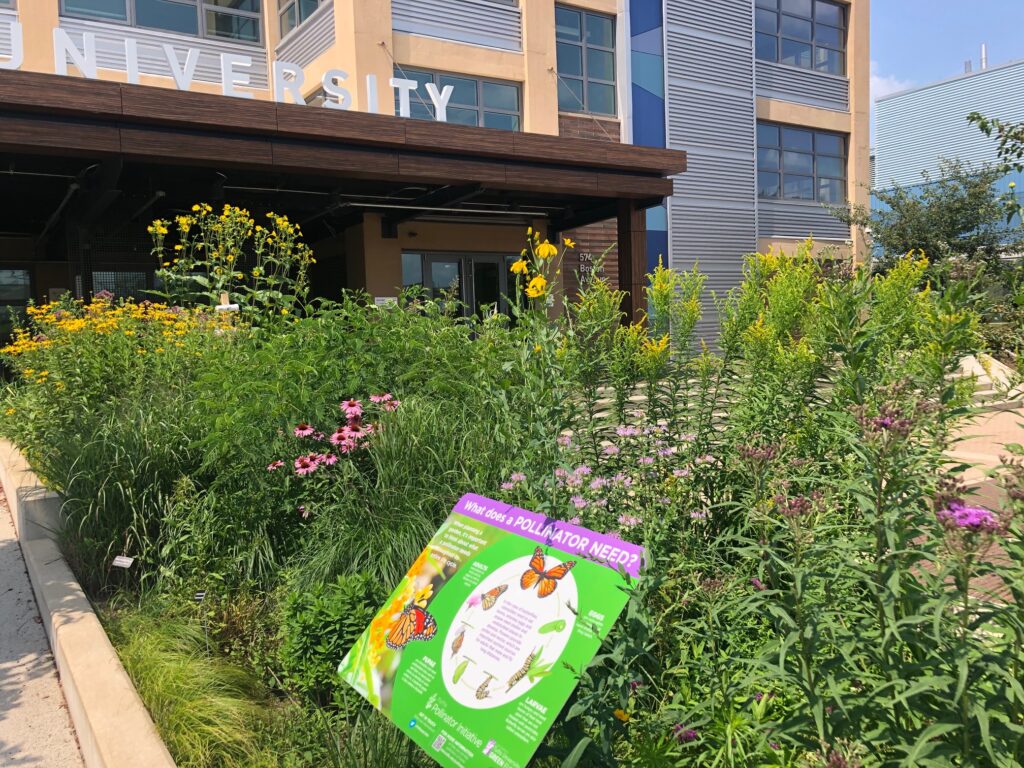
To date, TPI has replaced over 2,500 sq. ft of ornamental beds on campus with native, pollinator friendly habitat. During the past two years, we conducted surveys of flower-visiting insects to our campus gardens, and in all, we’ve spotted more than 115 species in our gardens, including specialist bees like Melissodes denticulatus and at-risk bumble bees like Bombus fervidus (find a complete list of campus pollinators here). Importantly, our gardens demonstrate to community members that gardens can simultaneously look pretty and be good for insects, and we have posted interpretive signage in our gardens to teach visitors how to join the urban pollinator conservation movement.
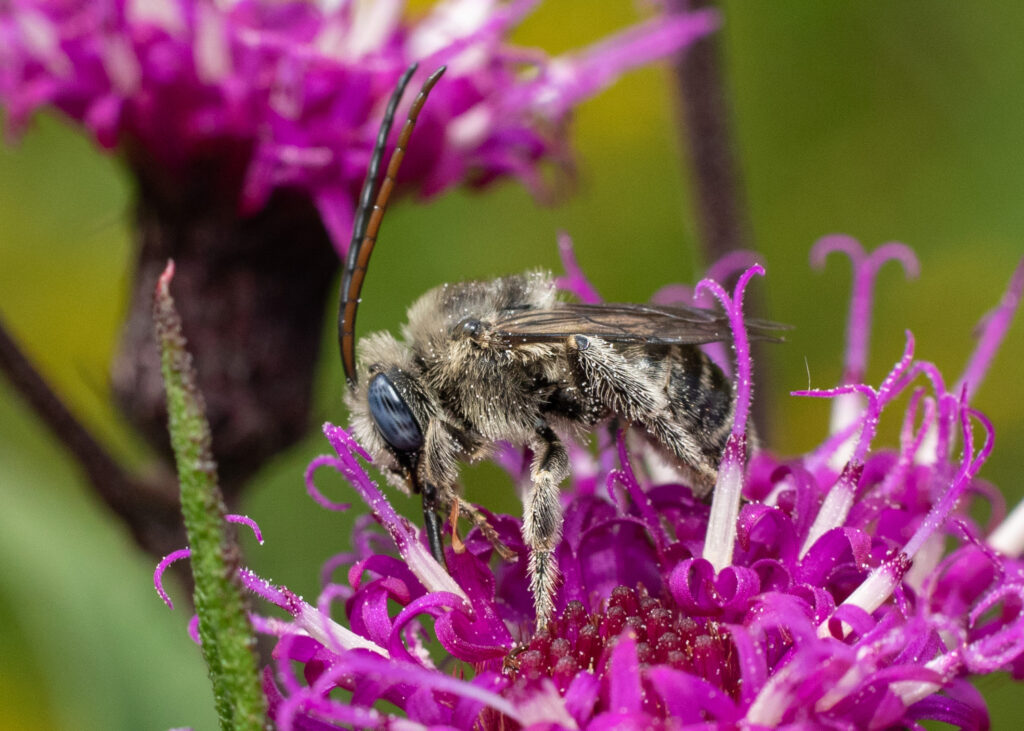
The next step to getting community buy-in was to increase access to pollinator gardening. We wanted to eliminate any barriers to getting started—cost and quality of plants, know-how, transportation to nurseries—that limit access to only experienced gardeners or those with resources to spare. In summer 2021, we hosted a discount native plant sale. We collected and germinated seeds from our garden to preserve local ecotypes, wrote and published handouts to make gardening less intimidating, then set up shop at our campus gardens within walking distance of thousands of homes. Each plant went for $2. The community response blew us away: we sold out of 850 plants in 90 minutes! With proceeds from this sale, we commissioned a pollinator-themed mural to enhance the green space accessible to our community members.
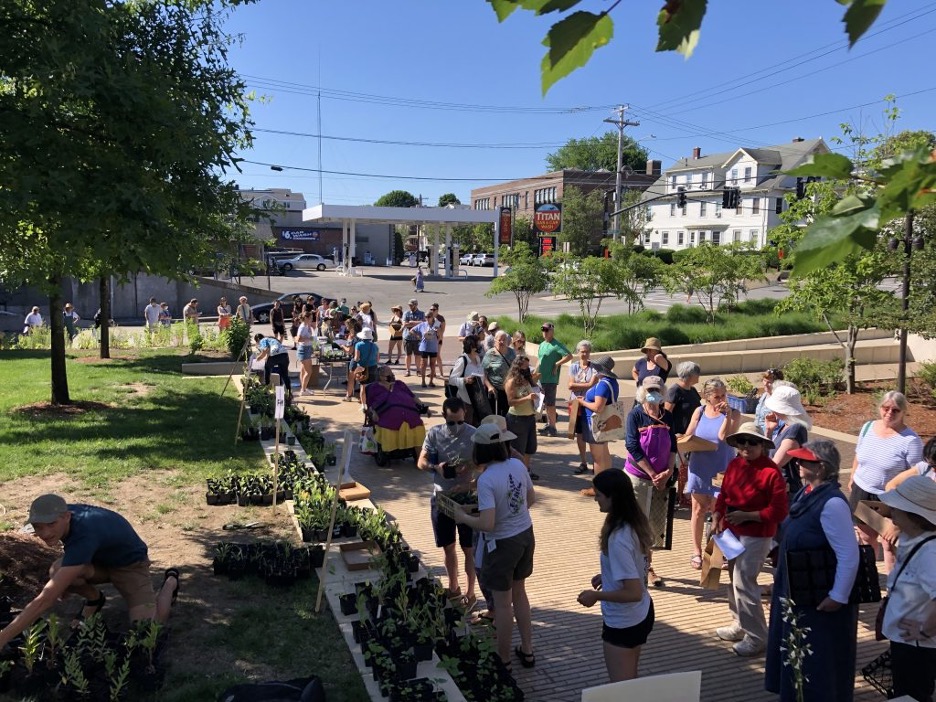
Beyond teaching people how to create pollinator habitat, we also teach people to notice, appreciate, and respect their local pollinators. Our approach focuses on sparking curiosity in people of all ages and backgrounds for insect pollinators. Each year, we engage with over 2,000 people in-person and with thousands more through social media (millions of views on @PollinateTufts Instagram Reels!). Our most popular in-person activity is the Pollinator Safari, where people visit gardens and learn from TPI naturalists how to observe, name, understand, and respect their neighborhood pollinators. We also host pollinator-themed trivia nights at local breweries, visit local elementary schools, deliver guest lectures to community groups, and teach semester-long classes to Tufts undergraduates. Throughout this work, TPI members leave community members with clear, concrete steps for conserving pollinators like “Use SEEDS: Sustain native landscapes, Employ a life cycle approach, Eliminate pesticide use, Discover what’s around you, and Share what you know.”
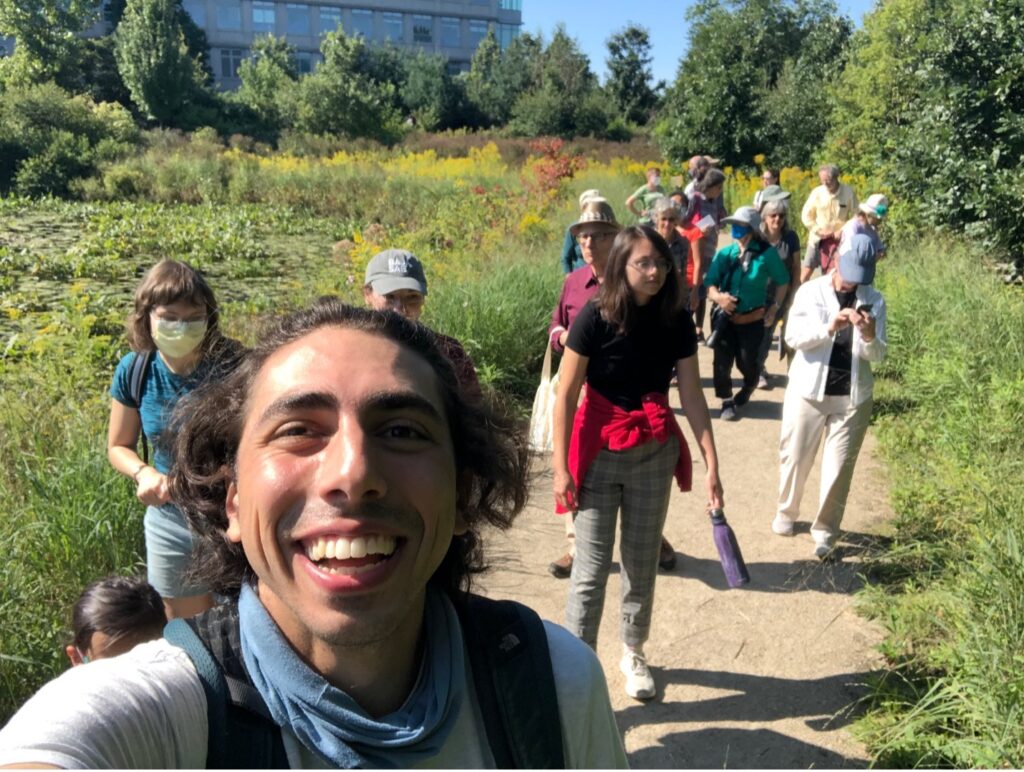
Ultimately, our work will be most impactful when others are galvanized to take action. Inspired by our work, Tufts student-led initiatives have collaborated with TPI to revitalize green roofs and add new gardens to the Museum of Fine Arts campus. We are the first metropolitan campus in Massachusetts to receive Bee Campus USA certification from the Xerces Society, and we hope that our work sets a precedent for other urban campuses to take part in pollinator conservation. Already, we have consulted with faculty and students from neighboring institutions—Harvard University, Lesley University, Boston University—on kickstarting pollinator conservation programs modeled after TPI.
Our work has demonstrated that the Boston area can support pollinators—and that empowering community members to help is a worthwhile endeavor! With over 50% of the world’s population currently living in cities, a number which is anticipated to grow in the coming decades, balancing the needs of people with the needs of urban biodiversity has never been more important. We are optimistic that cities can be places where people and pollinators not only co-exist, but mutually benefit—people create habitat for pollinators in their yards, and in return, pollinators reconnect people to local biodiversity, natural heritage, and food systems. If you are interested in learning more about our work, or launching your own urban pollinator conservation efforts, connect with us on our website, social media @PollinateTufts, or via email at [email protected]!
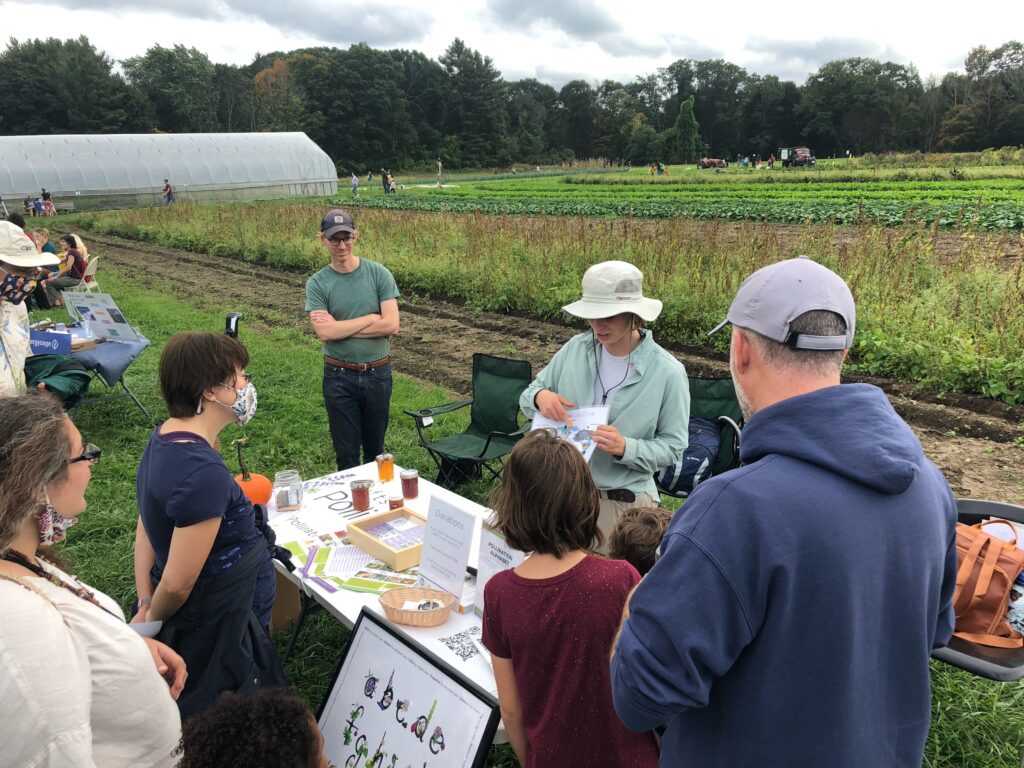
TPI leaders engage with community members at large outreach events like this one at a local farm. Photo credit: Tufts Pollinator Initiative 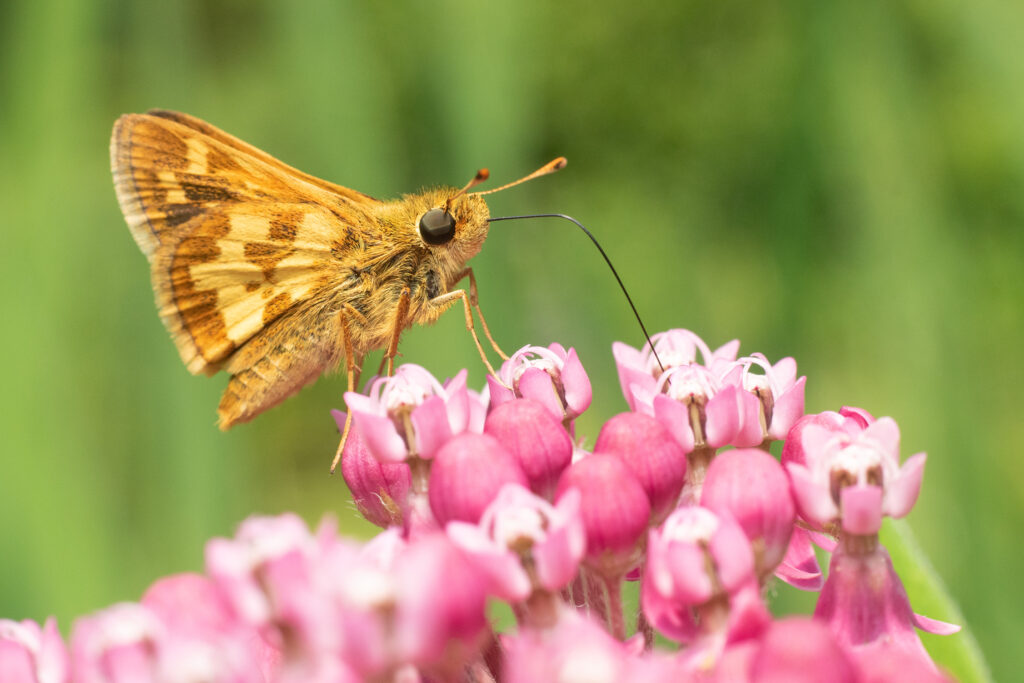
It is important to consider the entire life cycle when creating urban pollinator habitat. As adults, Peck’s skippers (Polites peckius) eat flower nectar, but as caterpillars they feed on native grasses. Photo credit: Nick Dorian 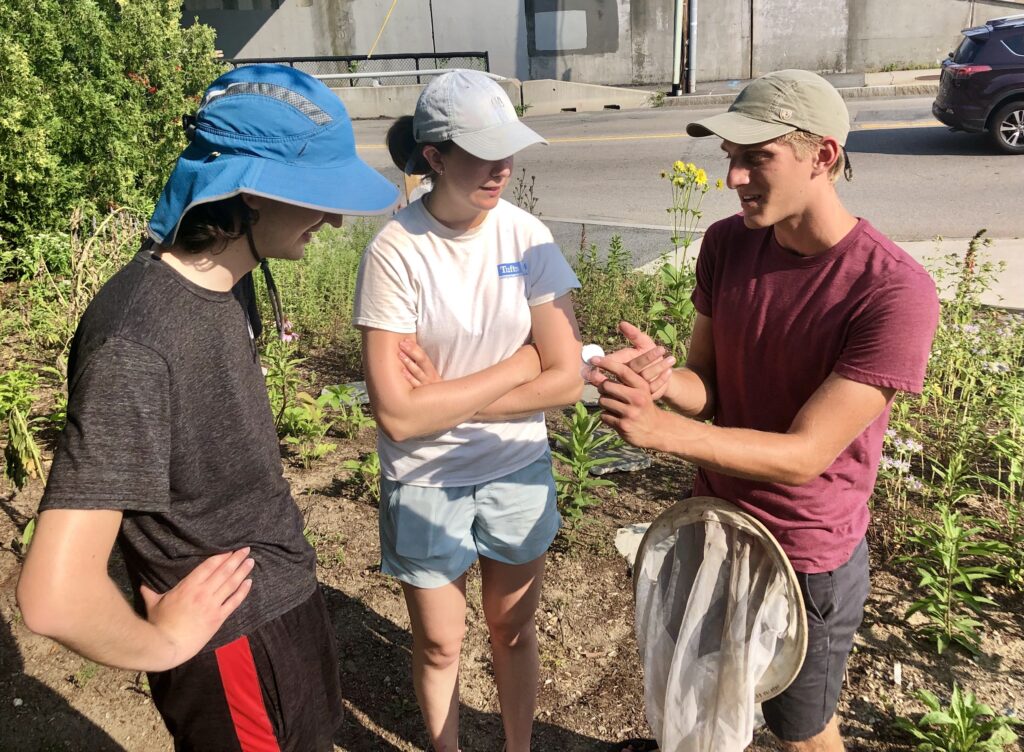
TPI teaches people how to observe, identify, and understand urban pollinators. Photo credit: Tufts Pollinator Initiative





